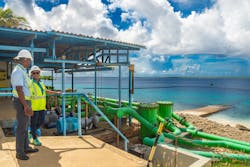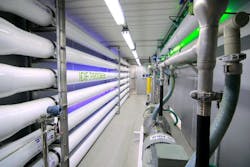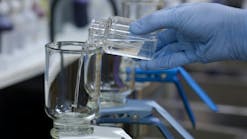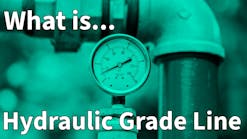Water scarcity is a worldwide issue. Today, nearly 700 million people worldwide suffer from water shortage, and that number is expected to grow to 1.8 billion in just 10 years, according to The United Nations. Although water covers about 70 percent of the planet, freshwater is much less common than most people would like to think. Of the water on our planet, 97 percent has an average salinity of 3.5 percent, making it unsuitable for drinking, industrial or agricultural applications. The planet’s freshwater is very unevenly distributed, with most of it being in the form of ice, snow, groundwater and soil moisture. Only 0.3 percent is in liquid form on the surface, and out of that surface water, 87 percent is contained in lakes, 11 percent in swamps and 2 percent in rivers. Two-thirds of the world’s freshwater is thus unavailable for consumption.
Beyond this, extreme climate change, intensifying water scarcity, rapid population growth and the never-ending increase in industrial development around the world are deeply affecting global freshwater resources, and the world’s ability to withstand ever-increasing droughts. The need for sustainable, environmentally-conscious water treatment solutions is clear now more than ever. Nearly 80 percent of people around the world live within 60 miles of a coast, making seawater and brackish water desalination an ideal and sustainable solution to combat rising water demands associated with population growth, diminishing water supplies and contamination.
Ocean to Tap: Enabling Water Security Using Eco-Friendly Technologies
The island of Bonaire, located off the coast of Venezuela in the Southern Caribbean region is fighting water scarcity head-on. Known for its pristine coastline, rich marine life and admirable dedication to natural conservation, the island is also passionate about enabling water security by producing 100 percent of its own drinking water. Bonaire is already well on its way to meeting this ambitious goal with the help of advanced, chemical-free desalination technologies.
With the construction of a new reverse osmosis (RO) plant in Hato, designed and built by IDE Technologies, the island is one step closer to achieving its objective for independently produced clean drinking water. Because the island of Bonaire aims to practice a sustainable, environmentally-friendly and energy-efficient desalination process that is 100 percent chemical-free, it opted for an alternative method to conventional desalination, which requires heavy chemical dosing to maintain clean RO membranes, prevent biofouling, scaling and subsequent potential downtime.
The harmful effects of chemical dosing and disinfection by-products, widely used in most desalination processes, have already been the focal point of numerous studies. These chemicals include N-nitrosodimethylamine (NDMA); 1,4 dioxide; trihalomethane (THM) and haloacetic acids (HAA) — all suspected to be toxic or carcinogenic. There is conclusive evidence that NDMA, a by-product of the chlorination process, is a potent carcinogen and genotoxic. Exposure to 1,4 dioxide may cause damage to the central nervous system, liver and kidneys, and THMs and HAAs are suspected to cause various heart, lung, kidney, liver and central nervous system damage.
Therefore, despite the obvious need to thoroughly remove all bacteria and pathogens from desalinated water, the serious health hazards that consumers might be exposed to might be enough to suggest a cleaner, safer alternative is needed. Chemical-free desalination makes it possible to achieve safe, crystal clear water without the possibility of carcinogens.
The Hato facility will produce up to 5,600 m3 per day of drinking water and will handle every stage of the RO process, including pretreatment, seawater RO (SWRO) and second pass brackish water RO (BWRO) stage in a chemical-free, natural and sustainable way. Combined with the output of an existing facility that processes 1,600 m3 per day of seawater, the plants will be able reach the output required to serve Bonaire’s nearly 22,500 inhabitants. Contracted through the island’s water and electric utility, Water- en Energiebedrijf Bonaire N.V. (WEB), the project is expected to be completed in early 2021.
Economic and Environmental Aspects of Chemical-Free Water Treatment
Chemical-free desalination offers a more sustainable alternative to traditional SWRO technology. Not only is it environmentally friendly, but also energy-efficient, cost-effective and enables easier ongoing operation. Utilizing natural, direct osmosis principles to keep the membranes constantly clean allows the osmosis process to backwash the membranes with permeate water, removing any fouling from the membranes’ surface and significantly improving membrane performance. As a result, membrane lifetimes become greater, which means a long-term reduction in energy consumption and stable, uninterrupted operation.
An SWRO desalination solution that uses a patented direct osmosis cleaning (DOC) process, the technology is based on a natural bio-flocculation process, which generates eco-friendly coagulation. Bio-flocculation utilizes nature to create flocs, generated by the reaction between certain bacteria and algae and excretes a sticky substance called EPS as a result. The bio-flocculation process then uses EPS as glue that coagulates fine suspended solids in seawater and allows for the efficient removal of these particles using the media filter (MMF). Since this solution includes a natural process that does not require coagulants, faster and more efficient filtration leads to higher quality filtrate, maintenance is kept to a minimum because the filtration media is kept continuously clean, and the impact on the environment is minimal as well.
Operational expenditure (OpEx) costs are reduced by up to 10 percent through a reduction in energy consumption and minimal maintenance. Additionally, chemical purchasing, the cost of which accounts for nearly 20 percent of yearly operational expenses, is drastically reduced. A shorter permitting process, and lack of needing chemical disposal permits also means a regulation-friendly process. Plus, having a modular configuration option available results in shorter installation time and minimized on-site construction work.
Ensuring a Water-Secured Future
As water shortage becomes more severe worldwide, it is critical for regions to invest in sustainable, environmentally-friendly desalination solutions. Remote locations face an even greater challenge when it comes to a steady source of fresh water, so utilizing a cost-effective solution that is easily installed, operated, maintained and customizable is critical for challenging locations.
Although global water shortage, rising populations and increasingly polluted water sources are already an alarming reality, responsible desalination has already been proven to offer an effective alternative to dwindling natural resources.
It is time for more regions to follow Bonaire’s impressive path toward responsible water resilience, which starts with the technologies they choose to implement, including their energy consumption, water reuse options, and the impact of their industrial output on their precious natural surroundings. At the end of the day, sustainability is good business. Regions that choose to incorporate environmentally-aware, financially-responsible and resource-effective water treatment methods will ensure their continuation for years to come. WW
About the Author: Gilad Cohen, CEO of IDE Americas, joined IDE in 2009 as corporate business development manager, responsible for investment evaluations and M&A activity, as well as development of new business platforms in target markets. Prior to IDE, he held the position as senior consultant for one of Israel’s leading management consulting firms on business competitive and corporate strategy, where he successfully led business development in South East Asia and Central Eastern Europe. Cohen holds a B.Sc. in computer sciences and an MBA in marketing management (magna cum laude), both from the Hebrew University in Jerusalem.





